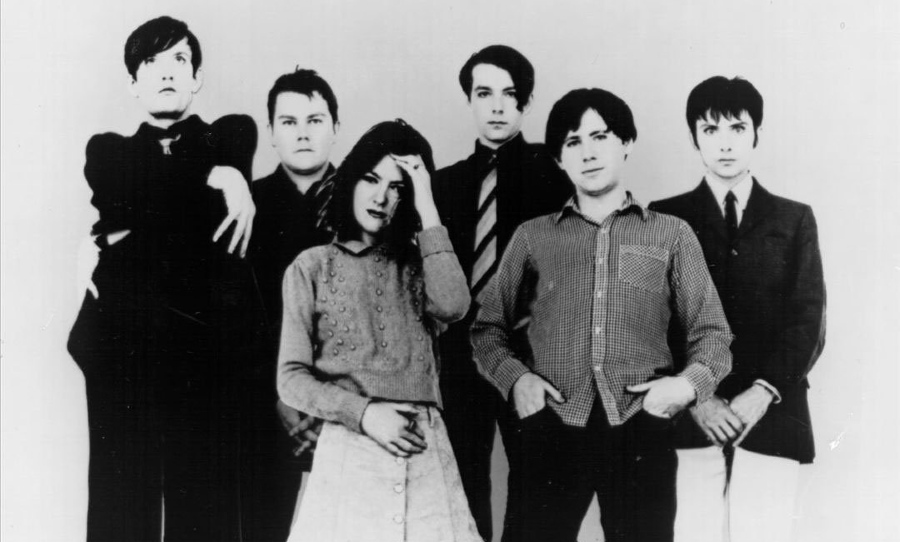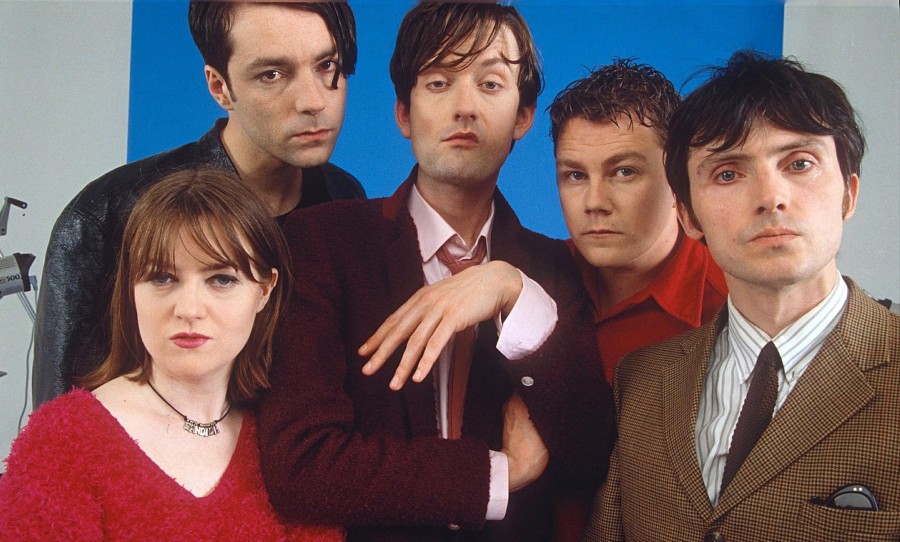Find out how an unnamed Greek student sparked a lower-class British anthem in Pulp’s Common People, a single that defined the Britpop era.
In 1995 Pulp laid down the quintessential soundtrack for every lower-class Englishman. Decades later, Common People still stands as one of the era’s most affecting songs.
Amongst the mid-’90s cultural movement of British pride, defined by the chart-topping battle between Oasis and Blur, Pulp and their disco-influenced pop rock sound finally slipped into the zeitgeist with a song that’s gone down in history.

I can’t see anyone else smiling here?
Pulp was formed in 1978 in the typically lower socio-economic British town of Sheffield, by 15-year-old Jarvis Cocker and a 14-year-old Peter Dalton. Their tenure in the 1980s was characterised by a revolving door of band members that saw no less than 19 musicians walk in and out of the Pulp doors.
Pulp’s first album It was recorded and released in 1983 with little to no commercial success, Cocker himself claiming they only managed to sell four copies. The band’s next major release Freaks, recorded in just one week due to label pressure, was the antithesis of the optimistic nature of their first album. Just as similarly, however, it failed commercially.
Cocker and his gawkily charismatic nature, coupled with his charity-shop fashion and trademark glasses, saw him stand out from most. His wit and observation of the lower-class English culture was often referenced in his lyricism, particularly in the way he described his relationships with women and sex. Self-described as awkward at the best of times, he once fell out of a window trying to impress a girl with a Spider-Man impression.
Cocker’s increasing frustration with Pulp’s lack of commercial success, member turnover, and a tempestuous relationship with their record label saw Pulp go on a hiatus in 1988. Cocker moved to London to study film at Saint Martin’s School of Art, the school that would provide the location of the spark behind Common People.
‘Cause everybody hates a tourist
During his time in London, Cocker had traded in some old records for a small Casiotone MT-500 keyboard that would be the chord catalyst behind Common People. In a 2010 interview with Uncut Magazine, Cocker explained, “When you buy an instrument, you run home and want to write a song straight away. So, I went back to my flat and wrote the chord sequence for Common People.”
Back and rehearsing with Pulp, this time with the more concrete group members of guitarist Russel Senior, bassist Steve Mackey, drummer Nick Banks, and Candida Doyle on keyboard, Cocker showed off his three-chord sequence.
Most of the band were less than impressed with the awkward chord progression, with Mackey unfavourably comparing it to Emerson, Lake & Palmer’s Fanfare for the Common Man. The comparison sparked Cocker’s mind back to an experience at Saint Martin’s College that would devise the narrative behind Common People.
One evening when out at a pub with college mates, Cocker struck up a conversation with a Greek-born student. As the opening lines of song recall, “She came from Greece she had a thirst for knowledge, she studied sculpture at Saint Martin’s College.”
Cocker’s conversation with the international student stuck out to him, in which she explained her plan to move Hackney, a London Borough known for its increasingly high crime rates at the time, to live like ‘the common people’. Cocker would later recall, “It turned out she was from quite a well-to-do background and somehow thought it would be interesting to go and live in a kind of scummy area and she found that exotic.”
Inspiration had struck. The song would rally against class tourism and the apparent envy of the lower-middle class, plus the misguided, romanticised idea that living with the ‘poor’ would allow wealthy students to broaden their cultural horizons. However, as Pulp would put it in the song, “You will never understand how it feels to live your life with no meaning or control and with nowhere left to go.”
Cocker took exception to the comments of the Greek girl, believing she would never be able to fully experience the life of the ‘common people’ as she could very easily live a life of comfort and wealth if she so pleased. This idea would resonate with many lower-class Englishman who sympathised with the concept behind the song.
Cocker would confirm the genesis behind the song in a 1996 interview with Q Magazine, stating “It seemed to be in the air, that kind of patronising social voyeurism, slumming it, the idea that there’s a glamour about low-rent, low-life.”
Since the release of the song, the identity of the Greek woman turned into an urban legend, with many attempts made to track her down. A 2006 BBC Three documentary endeavoured to find the identity of the student but came up empty-handed.
However, in 2015 a Greek newspaper believed they had traced all the details of the song back to Danae Stratou, wife of former Greek finance minister Yanis Varoufakis, who had studied architecture at Saint Martin’s College around the same time. While Cocker has never openly admitted the identity of the student, this rumour is as close as any.
I had to start it somewhere
In 1994, the narrative behind the song was set in stone, however, the lyrics were a work in progress and the band had yet to take the single into the studio. At the 1994 Reading Festival, Pulp decided to debut the single to a crowd of thousands to a raucous reaction.
This would start the upward momentum of the hit, as Pulp brought in Chris Thomas, co-producer of Sex Pistol’s album Never Mind the Bollocks, to help produce the single. Instrumental touches such as Senior’s violin, a stylophone, and even laser gun sounds were all implemented to up Pulp’s production from the ’80s into the ’90s. Revolutionary at the time, the tempo of the song would increase at each verse, starting at 90bpm and finishing at 160bpm.
Despite seemingly having all the bells and whistles, Cocker still wasn’t completely happy with the outcome. At 4AM on deadline day, he decided to put an acoustic guitar on the track to see if it would make the difference.
Chris Thomas recalled the aftermath to Uncut Magazine in 2010, “It was the crappiest sound you’d get, and it was compressing so much, it just sunk it into the track, it glued the whole thing together. That was the whip on the horse, that made it go.”
With production in the books, Pulp had the makings of a class anthem.
You are amazed that they exist
At the height of Oasis’ powers, with (What’s The Story) Morning Glory? set for release and Blur’s 1994 album Parklife dominating charts, out stepped Pulp with Common People.
The song never made the top spot in the UK singles chart, peaking at number two behind actors Robson & Jerome’s cover of Unchained Melody, however, the impact of the song went well past a charting position.
Riding off the momentum of the single, Cocker went on to write eight more songs for the album Different Class, which was released in October of that year and went on to reach number one in the UK album charts, obtain platinum status, and win the Mercury Music Prize in 1996.
On the back of the album, a message from the band read, “Please understand. We don’t want no trouble. We just want the right to be different. That’s all.”
Britain as a whole would take that message to heart and embrace the meaning behind it.
In 2014 the song was voted the number one Britpop anthem by 30,000 listeners of BBC Radio 6, beating out the likes of Oasis’ Wonderwall and The Verve’s Bittersweet Symphony, solidifying its importance to British culture at the time. Beyond that, Pulp has gone on to influence the likes of Arctic Monkeys’ lyricist Alex Turner, as well as the disco-fied indie stylings of Franz Ferdinand and The Killers, amongst many others.
Perhaps the culmination of Pulp’s climb to the top of British music came at Glastonbury festival in 1995. Original headliners Stone Roses were forced to pull out after an injury to guitarist John Squire, leaving the spot open for someone to make their name.
Cocker and his crew stepped in and delivered a performance that will go down in folklore, closing with Common People to a field of lit-up faces reciting the snarling British anthem back to Cocker.
In their comeback tour in 2011 at Reading Festival, the site of the birth of Common People, Cocker made clear his love for their hit single passionately claiming, “If Pulp are only ever remembered for this song, I don’t care, it’s a good song.”


